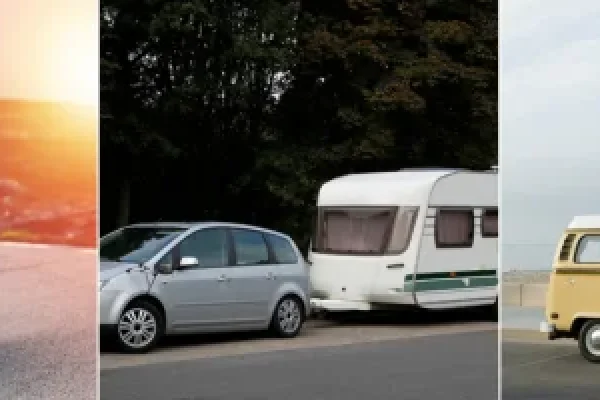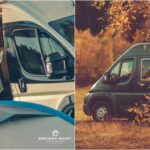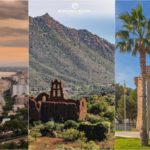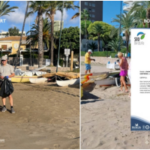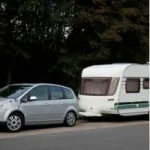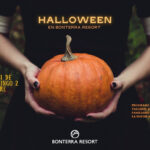Would you like to embark on a camping adventure on wheels? Would you like to enjoy nature, travel from place to place and take your home with you?
If so, you have probably asked yourself the following question: caravan, motorhome or campervan? Don’t worry, you’re not the only one.
Each type of vehicle has its advantages, its peculiarities and, above all, its own style of travel. At Bonterra Resort, our campsite in Benicassim, we see it every summer: there is no ‘best’ option, but rather one that best suits you and how you like to spend your holidays.
To help you make an informed decision, we’re going to take this opportunity to explain in simple terms the differences between each vehicle, how much they cost, what permits you need and which one might be your best travelling companion. Let’s get started!
What is each vehicle?
Caravan
A caravan is the classic trailer that attaches to a car and is fitted out as a mobile home. It is not motorised, so it depends on a vehicle that is motorised and can tow it.
They come in all sizes, from small ones for two people to veritable mini-apartments on wheels. The big advantage is that you can leave it parked at the campsite and move around freely with your car.
Motorhome
The concept of a motorhome is something else entirely. We are talking about a complete house on wheels. It has its own engine, is driven like a vehicle and has everything built in: beds, kitchen, bathroom, water tanks, heating… They are the most comfortable option if you like to move around every few days without depending on a car and a single destination.
Camper
The famous camper vans are usually smaller than motorhomes and easier to drive. There are vans that have been adapted with a bed and kitchen, or models that come fully equipped from the factory. Their strong point is freedom: you park, sleep and continue on your route without any complications.
Types and variants with their pros and cons
The issue of advantages and disadvantages is very personal. What may be a pro for one person may be a con for another. We have tried to classify them according to general feedback and conversations we have with our customers, but always speaking in general terms and without wanting to lecture 🙂
Caravans:
- Pros: they are cheaper, have more space, and offer the freedom to leave them set up at the campsite and move around with your car.
- Cons: they are more difficult to manoeuvre, you cannot sleep outside designated areas, and you need a car with a tow ball.
Motorhomes:
- Pros: you have everything in one, they have great autonomy, and they are perfect for long trips.
- Cons: they are more expensive, larger and consume more fuel.
Campervans:
- Pros: they are compact, easy to park, consume less fuel, and are ideal for quick getaways.
- Cons: less interior space, the toilet and shower are more limited (or non-existent in some models).
There are different types within each category. For example, small caravans for two people, coachbuilt motorhomes (with a bed above the cab, very family-friendly), low-profile motorhomes (more aerodynamic) or A-class motorhomes (luxury). Campervans range from small VW California-type models to large Fiat Ducato-type vans with a full shower and kitchen. We will be looking at all of this in more detail very soon on our blog.
Approximate cost of each type
Prices can vary greatly, but to give you an idea, here is a price range:
- Caravan: from around €7,000 for basic models to €25,000 for large, well-equipped models.
- Motorhome: between €55,000 and €100,000, depending on size and extras.
- Campervan: from €25,000 (if you build it yourself or it is basic) to €70,000 or more for high-end models.
To this must be added maintenance, insurance, road tax (for motorhomes and campers) and, if you do not have a garage, the cost of parking throughout the year.
Caravans require less maintenance, although brakes and tyres must also be checked regularly.
Driving, manoeuvring and life on the road
Driving a caravan requires a little practice, especially when parking or reversing. However, with patience and a good car, you will have no problems. What’s more, once you have set up at the campsite, your car is free to explore the surrounding area.
Our caravan customers highlight the convenience of being able to leave the caravan set up on their pitch and use the car to explore the surroundings of Benicassim at their own pace.
Motorhomes, on the other hand, are easier to drive than they look. Current models have rear cameras and power steering, but it is true that their size commands respect, especially in towns with narrow streets.
Finally, campervans are the most agile. They drive almost like a car and you can park in most car parks without attracting too much attention. They are perfect for restless travellers who change destinations every few days and do not need as much space.
Basic regulations in Spain
- Driving licences:
o Caravans up to 750 kg → B licence.
o Caravans over 750 kg → may require a B96 or B+E licence if they exceed 4250 kg.
o Motorhomes and campervans → B licence up to 3,500 kg; if heavier, you need a C1 licence.
- Parking and overnight stays: you can sleep in your vehicle as long as it is properly parked (without putting out tables or awnings) and you do not obstruct the public highway. However, camping is only permitted in designated areas or campsites.
- Speed limits:
o Caravans: 90 km/h on motorways.
o Motorhome and camper van: 120 km/h on motorways (provided they do not exceed 3,500 kg).
- MOT and insurance: compulsory for all motor vehicles and also recommended for caravans, especially if they are large or you use them frequently.
What to choose according to your profile
Families with children
If you are travelling with your family, a caravan is ideal. You have plenty of space, fixed beds and the freedom to leave it set up at the campsite while you go on excursions by car.
At Bonterra Resort, many families return every year with the same caravan, as they know the terrain and the children enjoy spending time with their friends.
Couples on short breaks
If you are travelling as a couple and planning romantic getaways, a camper van is your best bet. Compact, comfortable and hassle-free, it is perfect for setting off on a Friday afternoon and returning on Sunday without any major preparations or complications. You can park it almost anywhere and enjoy a stress-free trip.
Digital nomads / long trips
In this case, the motorhome wins. It’s your home and office on wheels. You have a shower, kitchen and a more stable space to live in for weeks or months. What’s more, there are models with solar panels and built-in Wi-Fi, ideal for working from anywhere.
Travelling with pets
If you are travelling with pets, it all depends on the size and comfort you are looking for. In general, caravans or motorhomes offer more space for your furry friend to travel in comfort.
At Bonterra Resort we are pet friendly, so your pets are always welcome. They also deserve their leisure and rest. With us, you can enjoy yourself with them without any problems.
Benicàssim, the ultimate destination
After all this theory, it’s time to think about the most important thing: the destination. Because it doesn’t matter if you’re travelling in a caravan, motorhome or camper van, what counts is where the road takes you. And in that sense, Benicàssim has it all.
Wide beaches, mountain trails, a family atmosphere and pleasant weather all year round. What’s more, our campsite is equipped to accommodate all types of vehicles: we have spacious pitches, electricity and water points, waste disposal areas, laundry facilities and all the services you need to feel at home.
Here you’ll find motorhome travellers touring Europe, families spending the whole summer in their caravans and couples arriving in their campervans for a weekend getaway. They all agree on one thing: it feels like home, but with the sea and mountains nearby.
So now you know. Before choosing a vehicle, think about how you like to travel, what you really enjoy and the kind of experiences you want to have. And when you’ve made up your mind, head for Benicàssim.
At Bonterra Resort we’ll be waiting for you with open arms, a big smile and that traditional camping atmosphere that never goes out of fashion.










